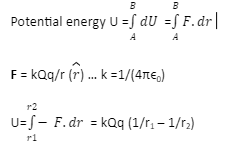Frequently Asked Questions on Electric Potential Energy
- What is electric potential energy?
Electric potential energy or electrostatic potential energy is the amount of work done against electrostatic force of interaction.
Electrostatic field is a conservative force field and it obeys inverse square law.
When a charged particle (q) is displaced from a point A to another point B in the presence of an electric field, work has to be done on the charge. The amount of work done to displace the charge is stored as potential energy and is called electric potential energy or electrostatic potential energy.
Thus, work done against electrostatic force of interaction = increase in potential energy of the system. i.e. F.dr = dU
Here F is electrostatic force, dr is the displacement vector, dU is change in potential energy.
- What is the expression for electric potential energy for a two static charge system?
To derive the expression for electric potential energy let us consider a point charge Q placed at origin. Let another point charge q be brought from a position A to a position B. Let A be at distance r1 from the origin and B be at distance r2 from the origin. In order to displace charge, q work has to be done against the electrostatic force of interaction. This work done is equal to the difference in the potential energy.
Therefore, work done dW = dU = – F.dr
Negative sign indicates displacement is opposite to the direction of force.

- What is the meaning of a reference point?
The point at which the electric potential can be considered as equal to zero is called the reference point. For a system of two charges when the second charge q in the electric field of Q, is displaced from point A at r1 to point B at r2; potential energy of the system of two charges is given by, U= kQq (1/r2 – 1/r1)
If we consider the initial distance r1= as the reference point then we get potential energy U = kQq (1/r2).
- What are the units of Electric Potential energy?
The SI unit of Electric potential energy is the same as that of energy, which is Joule (J).
Another unit of measurement is electron Volt (eV).
1ev = 1.6 x 10-19 joule.
- What is the meaning of Electric Potential or what is the difference between electric potential and electric potential energy?
Electric potential energy is defined as the amount of work done to displace a charge from one point to another point against the electrostatic force field.
Electric potential can be defined in terms of electric potential energy as equivalent to the work done to displace unit positive charge from one point to another point against the electrostatic field. Thus, electric potential is equal to electric potential energy per unit charge.
Therefore, Electric Potential (V) = Electric Potential energy (U) / charge (q)
This expression gives the relation between electric potential and electric potential energy.
- What is the SI unit of Electric Potential?
Electric Potential (V) = Electric Potential energy (U) / charge (q)
SI unit of Electric Potential energy (U) is joule (J), charge (q) = Coulomb (C)
Thus, the SI unit of Electric Potential is Joule/C or Volt.
- How is potential energy calculated for a system of N charges?
For a charge q brought from infinity (point of reference) to a point (at position r) in presence of another charge q1 the potential energy is given as U1 = kq1q/r. In case of a system of charge, work done or potential energy obeys the principle of superposition. Hence the total potential energy is given as the sum of potential energy between the charges present in the system.
- Why is the Electrostatic potential energy path independent?
Electrostatic field is a conservative field. That is electrostatic force law obeys inverse square law, thus the electrostatic force is a conservative force. Potential energy in consideration with the electrostatic field is defined as the work done against the electrostatic force. That is U =F.dr. Since the force field is conservative work done/ potential energy over a closed path is zero. This implies that electrostatic potential energy / work done is path independent. It depends on the initial and final position only.
- What is the expression for electrostatic potential due to a point charge?
Electric Potential (V) = Electric Potential energy (U) / charge (q)
For a unit positive charge, V = U = kQ/r. This is the expression for Electric potential due to a point charge Q at a distance r from the charge.
Conclusion
Electrostatic potential energy is considered in respect to the Electrostatic field. Word done is stored as potential energy. When this work is done to displace a charged particle in the presence of an electric field, it is stored as electrostatic potential energy.
The SI unit of electric potential energy is joule.
The electric potential is defined in terms of electrostatic potential energy. Electric potential is defined as electric potential energy per unit charge i.e. work done to displace unit charge. SI unit of electric potential is joule/C.
 Profile
Profile Settings
Settings Refer your friends
Refer your friends Sign out
Sign out






